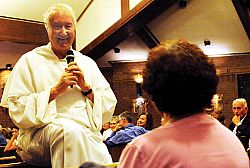Father Timothy Radcliffe shares humor and insight with diocesan audience
Friday, Oct. 17, 2014

Intermountain Catholic
+ Enlarge
Dominican Father Timothy Radcliffe listens to a question from an audience member during his Oct. 10 talk at Saint Vincent de Paul Catholic Church in Salt Lake City. IC photo/Marie Mischel
SALT LAKE CITY — Scripture and sexual ethics, as well as a healthy dose of wit and a few personal stories, helped Dominican Father Timothy Radcliffe convey his core message during his Oct. 10 presentation in Salt Lake City: the need to recognize that human beings are a unity of body and soul and spirit.
Fr. Radcliffe, a well-known author and lecturer, served as Master of the Order of Preachers from 1992 to 2001; he won the 2007 Michael Ramsey Prize for theological writing for his book What Is the Point of Being A Christian?.
Using Acts 3:1-8 and the famous quote from Saint Teresa of Avila as the basis for his talk, Fr. Radcliffe spoke on “how we are the hands of Christ, the ears of Christ, the face of Christ, the touch, the feet, the joy.”
He began his talk with his trademark humor, saying that before the presentation he stood outside Saint Vincent de Paul Catholic Church looking up at the mountains, and “it really is extraordinarily lovely, so I can’t think how you can manage to drag yourself away from looking at them to come look at me for a while.”
Catholics believe in the incarnate Word, and “one of the main ways that we get the message across is by being that Word in flesh and blood,” he said.
Acts 3, in which Peter and John heal the man who had been lame from birth, is “an incredibly physical story. It’s about listening, it’s about singing, it’s about touching, it’s about dancing,” Fr. Radcliffe said. “Christianity is a profoundly bodily religion,” although modern society is very ambiguous about bodies, presenting both the “cult of the body beautiful” but also embracing Descartes’ idea of ‘I think, therefore I am,’ “as if we were really minds, and so our bodies are unimportant,” he added.
By contrast, Saint Thomas Aquinas defined man as one substance, body and soul.
“I think we discover most beautifully what it is to be a body at the Last Supper, when Jesus takes the bread and he breaks it and he says, ‘This is my body, given for you,’” Fr. Radcliffe said.
Married couples give their bodies to each other “with the generosity, the fidelity and the vulnerability of Jesus,” Fr. Radcliffe said; similarly, parents caring for children, adult children caring for aging parents, doctors and nurses caring for the ill – all give away their physical strength and make a gift of themselves. “Our bodies are what divine love looks like in this world. The evolution of our bodies through the millennia was so that God could become flesh, pure love might become flesh and blood in our humanity.”
The body’s senses are important, Fr. Radcliffe said, pointing out the many Biblical stories that begin with listening: God calls Abraham out of his homeland, he calls to Moses from the burning bush and to Samuel in the temple.
Sight also figures prominently in the Catholic faith: Jesus sees Nathaniel under the fig tree, he recognizes that Levi is a good man despite being a tax collector, he notices the widow putting her mite into the treasury.
“Nobody else would have seen her,” Fr. Radcliffe said. “The beginning of all Christian ministry, a proclamation of the Gospel by every one of us, is learning how to look at people with tenderness, with gentleness, with love. Unless you do that, all our preaching the Gospel is an entire waste of time, because our faces can crush people or they can lift them up. … This is at the root of all Christian ministry, learning to look upon people graciously.”
Not least among the senses is touch, Fr. Radcliffe said. “So much of the ministry of Jesus is touch – he touches lepers, he touches the sick, he touches people you weren’t supposed to touch. He lets himself be touched, you know, by the woman who comes in weeping. He’s unafraid to be touched.”
About 200 people attended Fr. Radcliffe’s presentation; among them was Dorothy Tong, who said she enjoyed it because it was “a refreshing change from the kind of Catholic spirituality that I grew up with,” where the body was viewed as something bad.
Tooky Schuyler, who came with a group from Saint Florence Mission, also appreciated the point that humans are whole, body and soul. “That is often forgotten,” she said.
Likewise, Adrian Comollo, who attends Mass at Saint Catherine of Siena Newman Center, said he grew up when penitence and bodily mortification were “part of the vocabulary,” so he was happy to see the body portrayed in a positive way; Comollo said he is organizing a book discussion group of Radcliffe’s What Is the Point of Being A Christian?.
For questions, comments or to report inaccuracies on the website, please CLICK HERE.
© Copyright 2024 The Diocese of Salt Lake City. All rights reserved.
© Copyright 2024 The Diocese of Salt Lake City. All rights reserved.

Stay Connected With Us